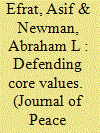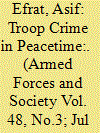|
|
|
Sort Order |
|
|
|
Items / Page
|
|
|
|
|
|
|
| Srl | Item |
| 1 |
ID:
141858


|
|
|
|
|
| Summary/Abstract |
This article analyzes the determinants of international child adoption. We argue that prospective parents' desire to reduce transaction costs and ensure a successfully completed adoption influences adoption flows. Drawing on dyadic panel data over the period 1991–2010, we fit hurdle models to identify sending-country and dyad characteristics that correlate with adoption flows. We show that an international agreement designed to ensure the integrity of adoption depresses foreign adoptions by raising transaction costs. By contrast, adoption is more likely when sending countries have a high-quality regulatory environment and when colonial or migration ties exist within the dyad. Our findings highlight the impact of transaction costs on transnational, non-market exchange, expand political economy models of migration, and emphasize the importance of private international law in international relations.
|
|
|
|
|
|
|
|
|
|
|
|
|
|
|
|
| 2 |
ID:
140877


|
|
|
|
|
| Summary/Abstract |
International conferences can be highly efficient venues for collecting cross-national data. Such conferences offer the opportunity to meet and interview government officials and other elites from numerous countries worldwide, all at a single location and within a few days. The article encourages IR scholars to take advantage of this underutilized opportunity and provides advice for doing so.
|
|
|
|
|
|
|
|
|
|
|
|
|
|
|
|
| 3 |
ID:
147084


|
|
|
|
|
| Summary/Abstract |
The cross-border movement of people, goods, and information frequently results in legal disputes that come under the jurisdiction of multiple states. The principle of deference—acceptance of another state's exercise of legal authority—is one mechanism to manage such jurisdictional conflicts. Despite the importance of deference in international law and cooperation, little is known about the causes of variation in its use. In this article, we develop a theory of deference that focuses on the role that domestic institutions and norms play in ensuring procedural and substantive fairness. We test this theory in an original data set concerning accession practices in the Hague Convention on International Child Abduction. Our findings offer considerable support for the idea that states evaluate partners on the likelihood that they can offer a fair legal process. Exploring empirically the efforts against parental child abduction, we offer a nuanced account of the link between domestic institutions and norms and international cooperation. This account suggests that greater attention should be paid to the use of deference as a mechanism to manage the conflicts posed by globalization.
|
|
|
|
|
|
|
|
|
|
|
|
|
|
|
|
| 4 |
ID:
173213


|
|
|
|
|
| Summary/Abstract |
Are states willing to overlook human rights violations to reap the fruits of international cooperation? Existing research suggests that this is often the case: security, diplomatic, or commercial gains may trump human rights abuse by partners. We argue, however, that criminal-justice cooperation might be obstructed when it undermines core values of individual freedoms and human rights, since the breach of these values exposes the cooperating state to domestic political resistance and backlash. To test our argument, we examine extradition: a critical tool for enforcing criminal laws across borders, but one that potentially threatens the rights of surrendered persons, who could face physical abuse, unfair trial, or excessive punishment by the foreign legal system. We find support for our theoretical expectation through statistical analysis of the surrender of fugitives within the European Union as well as surrenders to the United States: greater respect for human rights correlates with the surrender of fewer persons. A case study of Britain confirms that human rights concerns may affect the willingness to extradite. Our findings have important implications for debates on the relationship between human rights and foreign policy as well as the fight against transnational crime.
|
|
|
|
|
|
|
|
|
|
|
|
|
|
|
|
| 5 |
ID:
145107


|
|
|
|
|
| Summary/Abstract |
Human trafficking has been the subject of growing attention from both scholars and policymakers. The internationally accepted definition of human trafficking used by governments and international organizations identifies three purposes of trading in persons: sexual exploitation, labor exploitation, and the removal of organs. I argue that conflating sex, labor, and organ trafficking in policy initiatives and in the scholarly literature overlooks major differences between these practices—differences that greatly affect governments' willingness and ability to curb them. This article identifies three such differences: the social status and political influence of the perpetrators, the precision of norms and their resonance with audiences, and the costs of enforcement. Through these distinctions, I explain why Israel has been vigorous in combating sex trafficking, yet hesitant to tackle labor and organ trafficking. The Israeli experience highlights the different challenges posed by sex, labor, and organ trafficking and offers important lessons for the study of these phenomena.
|
|
|
|
|
|
|
|
|
|
|
|
|
|
|
|
| 6 |
ID:
189930


|
|
|
|
|
| Summary/Abstract |
The peacetime deployment of U.S. forces in foreign countries goes against traditional notions of sovereignty. How did such deployment become legitimate following World War II? This article examines the legal strategy that the U.S. military employed to make American troop presence more palatable to foreign publics and to critics at home: granting certain legal authority over offending troops to host countries, while seeking to shield troops from trials in host-country courts. The military also used local, informal ties with hosts to guarantee fair legal treatment for troops and worked to convince skeptics that U.S. troops faced no legal threat. The mitigating of legal tensions helped the military create conducive political conditions for its presence abroad and likely contributed to the durability of U.S. deployments. The Cold-War practice contrasts sharply with the contemporary desire of the United States to maintain complete jurisdiction over its troops.
|
|
|
|
|
|
|
|
|
|
|
|
|
|
|
|
| 7 |
ID:
151273


|
|
|
|
|
| Summary/Abstract |
Non–legally binding agreements provide an important tool for establishing international cooperation. We know little, however, about the variation in the implementation of such agreements. This article identifies a major cause of this variation: legal tradition. Nonbinding agreements, which may be adapted to local needs and circumstances, are consistent with the gradual, organic evolution of common law; by contrast, they are an uneasy fit with the civil-law tradition that neatly distinguishes between “law” and “nonlaw.” Consequently, common-law countries are more likely to implement nonbinding agreements than civil-law countries. Survival analysis of three nonbinding instruments—United Nations model laws aimed at harmonizing commercial legislation—finds strong support for this argument: common-law countries prove significantly more likely to implement these model laws.
|
|
|
|
|
|
|
|
|
|
|
|
|
|
|
|
| 8 |
ID:
093821


|
|
|
|
|
| Publication |
2010.
|
| Summary/Abstract |
Contrary to the general trend of trade liberalization, specific goods-such as small arms, drugs, and antiquities-have come under increasing international control in recent decades through a set of international regulatory agreements. This article offers a theoretical framework of government preferences on the international regulation of these goods. Departing from conventional models of trade policy, the theoretical framework introduces negative externalities, rather than protection, as the motivation for restricting trade; it also takes moral concerns into account. I test this framework empirically through an original survey of government views on international small-arms regulation. Based on interviewing officials from 118 countries, the survey reveals a large variation in government preferences that conforms to the theoretical expectations. I employ this variation to explain why the international regulation of small arms is weak, despite the fact that these are the deadliest weapons of all in terms of actual death toll.
|
|
|
|
|
|
|
|
|
|
|
|
|
|
|
|
| 9 |
ID:
186347


|
|
|
|
|
| Summary/Abstract |
U.S. forces abroad have often faced complaints about crimes committed by troops, yet we lack systematic quantitative information on such crimes. Based on newly discovered data compiled by the Army, this article presents a comprehensive and detailed picture of American troops’ criminal activity worldwide during the Cold War (1954–1970). The data show that troops engaged in significant criminality, with a particularly high rate of violent crime—homicide, rape, and robbery—and a relatively low rate of property crime. Host countries treated offending troops leniently: Prison sentences were rare, and they averaged less than 2 years in duration. The data presented here hold far-reaching implications for our understanding of the relations between U.S. forces and host countries and the legacy of U.S. military deployments.
|
|
|
|
|
|
|
|
|
|
|
|
|
|
|
|
|
|
|
|
|